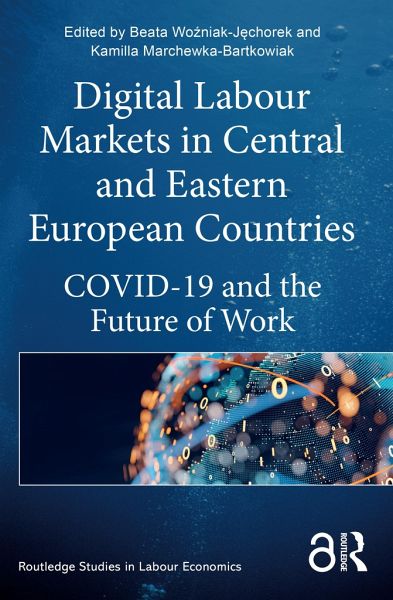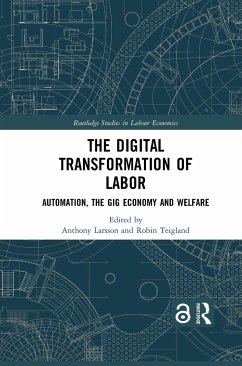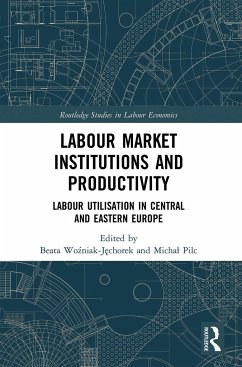
Digital Labour Markets in Central and Eastern European Countries
COVID-19 and the Future of Work
Herausgegeben: Wozniak-Jechorek, Beata; Marchewka-Bartkowiak, Kamilla
Versandkostenfrei!
Versandfertig in 6-10 Tagen
41,99 €
inkl. MwSt.

PAYBACK Punkte
21 °P sammeln!
This book examines the impact of the COVID-19 pandemic on changing labour markets and accelerating digitalisation of the workplace in Central and Eastern Europe. It provides an innovative and enriching take on the work experience from the pandemic times and discusses the challenges of ongoing changes in labour markets and workplaces in a way that is not covered by the extant literature.The impact of the COVID-19 pandemic and digitalisation on labour market outcomes is analysed throughout 12 chapters, by 34 labour market experts from various CEE countries. Most chapters are based on empirical m...
This book examines the impact of the COVID-19 pandemic on changing labour markets and accelerating digitalisation of the workplace in Central and Eastern Europe. It provides an innovative and enriching take on the work experience from the pandemic times and discusses the challenges of ongoing changes in labour markets and workplaces in a way that is not covered by the extant literature.
The impact of the COVID-19 pandemic and digitalisation on labour market outcomes is analysed throughout 12 chapters, by 34 labour market experts from various CEE countries. Most chapters are based on empirical methods yet are presented in an easy-to-follow way to make the book also accessible for a non-scientific audience. The volume addresses the three key goals:
to better understand the impact of the COVID-19 pandemic on the adoption of workplace digitalisation in the selected labour markets in CEE countries and the potential trade-offs facing those who do and do not have access tothis benefitto complement the labour market research by incorporating the outputs of changing demand for skillsto contribute new insight into policies and regulations that govern the future of work
The book argues that the recent COVID-19 pandemic was a sombre reminder of the relevance and necessity of digital technology for a variety of sectors and market activities. It concludes that to downside the risks of vanishing jobs, as well as to minimise the threats and maximise the opportunities of digitalisation in CEE countries, labour market partners need to consider an effective governance tool in terms of inclusive access to the digital environment, re-skilling, and balanced regulations of the more problematic facets of digital work.
The book will be of interest to postgraduate researchers and academics in the fields of labour economics, regional economics, and macroeconomics. Additionally, due to the broader policy implications of the topic, the book will appeal to policymakers and experts interested in labour economics.
The Introduction, Chapters 4 and 12 of this book are freely available as a downloadable Open Access PDF at http://www.taylorfrancis.com under a Creative Commons Attribution-Non Commercial-No Derivatives (CC-BY-NC-ND) 4.0 license.
The impact of the COVID-19 pandemic and digitalisation on labour market outcomes is analysed throughout 12 chapters, by 34 labour market experts from various CEE countries. Most chapters are based on empirical methods yet are presented in an easy-to-follow way to make the book also accessible for a non-scientific audience. The volume addresses the three key goals:
to better understand the impact of the COVID-19 pandemic on the adoption of workplace digitalisation in the selected labour markets in CEE countries and the potential trade-offs facing those who do and do not have access tothis benefitto complement the labour market research by incorporating the outputs of changing demand for skillsto contribute new insight into policies and regulations that govern the future of work
The book argues that the recent COVID-19 pandemic was a sombre reminder of the relevance and necessity of digital technology for a variety of sectors and market activities. It concludes that to downside the risks of vanishing jobs, as well as to minimise the threats and maximise the opportunities of digitalisation in CEE countries, labour market partners need to consider an effective governance tool in terms of inclusive access to the digital environment, re-skilling, and balanced regulations of the more problematic facets of digital work.
The book will be of interest to postgraduate researchers and academics in the fields of labour economics, regional economics, and macroeconomics. Additionally, due to the broader policy implications of the topic, the book will appeal to policymakers and experts interested in labour economics.
The Introduction, Chapters 4 and 12 of this book are freely available as a downloadable Open Access PDF at http://www.taylorfrancis.com under a Creative Commons Attribution-Non Commercial-No Derivatives (CC-BY-NC-ND) 4.0 license.














